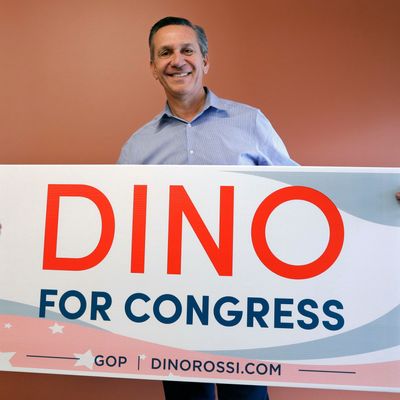
All the talk this year about California’s Top Two primary system may have obscured the fact that Washington State has used Top Two (in which the first and second place finishers in any primary, regardless of party or percentage of the vote, proceed to the general election) since 2008. And for decades before that, Washington had a similar but not identical “blanket primary” allowing voters to participate in either party’s primary for any one post, until the Supreme Court invalidated this system in 2000. Political observers have noted that Washington’s primary results under Top Two seem to have a strongly predictive quality of how the two parties will do in the general election, making these results a bellwether of national as well as state trends. RealClearPolitics’ election analyst Sean Trende has suggested Washington’s relatively late primary serves a prophetic function much like Maine used to when it had a separate, earlier general election.
While Washington didn’t have any primaries this year in which there was a serious danger of “Top Two Lockout” (an otherwise competitive party failing to place a candidate in the general election), that obsessive fear of California Democrats, the share of the total vote for each party remains significant. And on August 7, it didn’t look good for Republicans, though it’s worth remembering that in all-mail-ballot Washington the votes are still drifting in. Here’s FiveThirtyEight’s insta-analysis:
In Washington’s 3rd District, which was supposed to be a “Likely” if not “Solid” Republican district, Democratic candidates are currently winning more total votes than Republican candidates, 50.3 percent to 49.7 percent. The GOP-held 5th District looks competitive too — Republicans have won an aggregate 51 percent vs. 47 percent for Democrats. And Democrats appear to have an edge in the 8th District, expected to be a pure toss-up: Democratic candidates are pulling 50 percent of the vote there, compared with Republicans’ 47 percent.
Sure enough, the Cook Political Report has already moved WA-03, defended by Rep. Jaime Herrera Beutler, from “Likely Republican” to “Leans Republican,” with this comment:
Herrera Beutler hasn’t had a real race since 2010, but the preliminary August 7 top-two primary results are a wake up call: she took just 41 percent to WSU-Vancouver law professor Carolyn Long’s 37 percent. Overall, Democrats are currently combining for a narrow majority of primary votes. Long had raised $662,000 to Herrera Beutler’s $1.5 million by mid-July. This onetime long shot has developed into a genuinely competitive race.
Cathy McMorris Rodgers, the fourth-ranking Republican (and highest-ranking Republican woman) in the House, was already facing a competitive race; Cook had her 5th district rated as “Lean Republican” before the primary. Even though this is a district that Trump carried by 13 points in 2016, it’s looking dicey for the GOP now. And because it is, you have to figure the House GOP majority that elevated Rodgers to a position of power is dicey as well.
The suburban 8th district is open thanks to the retirement of veteran Republican Dave Reichert. The GOP figured it had a great chance to hold the seat with veteran statewide candidate Dino Rossi, who lost a crazy close gubernatorial race in 2004, and did credibly in a 2008 gubernatorial run and a 2010 Senate race against Sen. Patty Murray. But the primary numbers show a decided Democratic advantage heading into November in what was already rated a tossup contest. Rossi’s opponent hasn’t been identified just yet:
A pair of Democrats were in close competition for the second slot — physician Kim Schrier, who was endorsed by Emily’s List and most labor unions; and Jason Rittereiser, a lawyer, who argued that his rural roots would make him more electable in November.
But either way, Rossi is in danger of finding that the fourth time isn’t necessarily a charm. And as Trende emphasizes, that’s not a good sign for Republicans everywhere:
If we really are talking about Republicans marginally overperforming the primary vote in Washington’s 3rd and 5th districts on Election Night, it doesn’t bode well for what is occurring elsewhere.
It’s all about the competitive landscape, and more and more GOP House districts are beginning to look shaky.






























